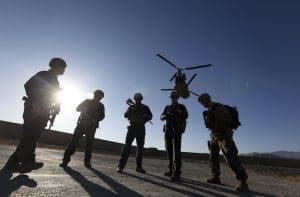Sikhs and Hindus face violence as US troops withdraw from Afghanistan
Advocates for Sikh and Hindu minorities in Afghanistan warn of ‘impending genocide.’

As American troops leave Afghanistan after 20 years, the country’s small religious minority of Sikhs and Hindus face immediate danger. Advocates say the United States must help resettle them.
“We are worried about impending genocide,” Sai Rajagopal, a South Asian studies researcher at Oxford University, told The American Independent Foundation.
Sikhs and Hindus once comprised a robust community of hundreds of thousands of people in an ethnically diverse Afghanistan, but the population now stands at less than 1,000 people, according to some calculations, as people have emigrated to flee violence and discrimination.
Repression against religious minorities began to worsen during the mujahedeen insurgency against the Soviet-supported government of Afghanistan that started in 1978 and continued after the invasion of the country by the Soviet Union in 1979.
After 10 years of fighting, the Soviets withdrew and fighting continued among factions in Afghanistan, with the Islamic fundamentalist Taliban taking control of most of the country in 1994 and holding it until the United States and its allies invaded the country in October 2001 in the wake of the terrorist attacks of 9/11.
The Taliban discriminated against religious minorities, including Sikhs and Hindus as well as Christians, Baha’is, and Ahmadi Muslims. Sikhs were forced to wear yellow armbands to distinguish themselves.
While Afghanistan’s 2004 constitution grants all the freedom “to exercise their faith and perform their religious rites,” a weak government, plagued by dysfunction, has failed to guarantee the safety of religious minorities, and the constitution notes, “No law shall contravene the tenets and provisions of the holy religion of Islam in Afghanistan.”
The Australian Institute of International Affairs reported in 2018:
Sikhs continue to face discrimination in the labour market and avoid sending their children to public schools due to bullying. Education in many cases is only available informally at gurdwaras. Sikhs have had to scale back celebrations of their religious festivals so as not to attract attention. Yet as a visibly recognisable group, they are subject to harassment and pressure to convert to Islam when in public.
In addition to discrimination, Sikhs and Hindus face violence that experts fear will only get worse as U.S. troops withdraw and the country threatens to collapse further into chaos.
In 2018, 17 Sikhs and Hindus traveling to meet Afghanistan’s president, Ashraf Ghani, were killed by a suicide bomber.
Two years later, the Islamic State claimed responsibility for an attack on a Sikh temple in Kabul, in which gunmen and suicide bombers took 200 worshippers hostage for hours and eventually killed 25.
And just days ago, two Sikhs were injured after a grenade tore through a shop in Jalalabad.
“An increase in attacks by extremist groups—most notably the Islamic State in Khorasan Province (ISIS-K) and the Taliban—not only threatened Afghanistan’s overall stability but also decimated religious minorities, particularly the Sikh community, which faces near extinction in Afghanistan,” according to the United States Commission on International Religious Freedom’s Annual Report in 2021.
“[Sikhs and Hindus] will have no choice but to leave the country, because the state is not willing or capable of protecting them,” Jawad Hassan Zadeh, an Afghanistan expert who prepares reports for international organizations, told The American Independent Foundation.
Some Sikhs and Hindus fled to nearby India on special visas in 2020, though about 40 families returned to Afghanistan this year, citing a lack of financial support.
“Just living in another country is not sufficient, they have to have the right to education, to free movement, to be recognized to participate in politics, to have all the freedoms that we enjoy in the West,” Zadeh said.
Former President Donald Trump announced the withdrawal of American troops from Afghanistan in 2020, despite protests from Pentagon officials that the country might spiral back into even worse unrest and undercut peace talks between the Taliban and Afghan officials. Gen. Austin Miller, the commander of the U.S. mission there, warned on June 29, “Civil war is certainly a path that can be visualized if it continues on the trajectory it’s on. That should be a concern for the world.”
The pullout neared completion on Friday as forces left Bagram Air Base north of Kabul.
“The clock is really ticking for ensuring that Sikhs and Hindus left there have a chance at safety,” Henna Hundal, a Global Future Council fellow at the World Economic Forum, told The American Independent Foundation.
She added, “As we’re entering this period of uncertainty about what the country will look like in six months and one year from now, there’s a key window right now to intervene.”
The Sikh Coalition, a civil rights group formed in the wake of 9/11, has been leading the drive to see Sikhs and Hindus resettled with special priority embassy referrals through the United States refugee program.
In 2020, the group urged Sikh Americans to pressure legislators to act and mobilized 24 other civil rights and community organizations to sign on to a letter to Congress demanding action.
As a result, nearly 50 lawmakers, including then-Sen. Kamala Harris (D-CA), Sen. Chuck Schumer (D-NY), and Rep. Jerry Nadler (D-NY), took up the call in a letter to then-Secretary of State Mike Pompeo.
In the wake of the 2020 ISIS temple attack, Biden pledged his support for Afghan Sikhs and Hindus on the campaign trail.
“I stand with the Sikh and Hindu communities in Afghanistan seeking safety for their families and the freedom to practice their faiths, and urge the Department of State to consider the request for emergency refugee protection,” his campaign wrote in a post.
Advocates want America to help Sikhs and Hindus leave the country on chartered flights through Kabul’s Hamid Karzai International Airport.
Without U.S. help, they say, the community is facing destruction.
“All of this depends on the will of the Western nations like the United States,” Zadeh said. “If there is funding, if there is financial support and logistical support and there is a motion in the American Congress, then obviously that will aid them to move faster — just saying words like ‘We should protect these people and they should be safe’ does not help.”
Published with permission of The American Independent Foundation.
Recommended

Biden on abortion rights: President expects to give speech Tuesday on new Florida 6-week ban
‘Having the president of the United States speaking out loud and with confidence about abortion access is a great thing’
By Mitch Perry, Florida Phoenix - April 22, 2024
Biden calls for expanded child tax credit, taxes on wealthy in $7.2 trillion budget plan
President Joe Biden released his budget request for the upcoming fiscal year Monday, calling on Congress to stick to the spending agreement brokered last year and to revamp tax laws so that the “wealthy pay their fair share.”
By Jennifer Shutt, States Newsroom - March 11, 2024
Biden rallies Democrats in Las Vegas: ‘Imagine the nightmare’ if Trump reelected
With a primary win all but inevitable, President Joe Biden used his Sunday appearance in Las Vegas’s Historic Westside to rally his most vocal supporters in a battleground state that delivered for him four years ago.
By April Corbin Girnus, Nevada Current - February 05, 2024







































































